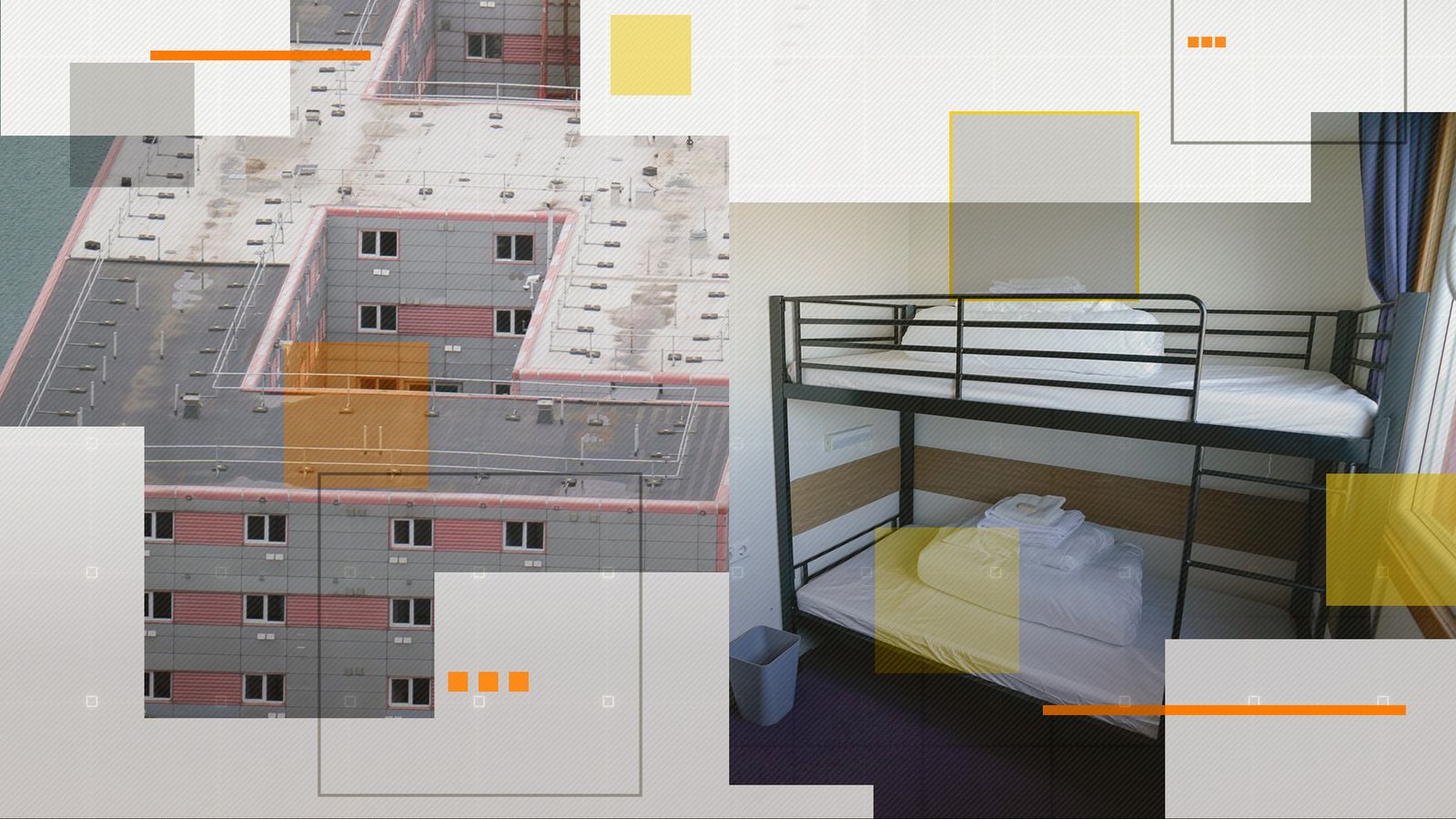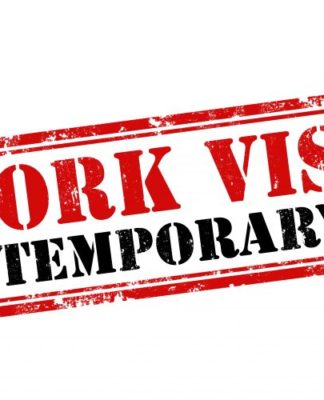Analysis
Asylum backlog: Government must triple activity to meet target
As the first asylum seekers board the Bibby Stockholm, a Sky News analysis shows the barge will hardly make a dent in the UK’s asylum bill.
By Ben van der Merwe and Joely Santa Cruz, data journalists
Monday 7 August 2023 22:04, UK
Listen to this article
0:00 / 8:29
1X
BeyondWords
Audio created using AI assistance
Teaser
Why you can trust Sky News
The government will fail to meet its asylum backlog target without a drastic increase in the processing of applications, a Sky News analysis has found.
At present, there are more than 136,000 asylum applications waiting for an initial decision, including 62,000 that were made before 28 June 2022 – the so-called “legacy backlog”.
In December Rishi Sunak pledged to clear the legacy backlog by the end of 2023. Since then, however, the Home Office has processed just 936 such cases per week.
If the prime minister is to meet his target of clearing all 62,000 remaining cases this year, the Home Office will need to work more than three times as fast.
At current rates, there are set to be more than 41,000 legacy backlog cases remaining by the end of the year.
Update:
Asylum seekers face losing support if they don’t board barge
Home Office figures released today show that the prime minister is struggling to make an impact in another key area of asylum policy: the use of expensive contingency accommodation, such as hotels and B&Bs, to house asylum seekers.
Mr Sunak pledged to end the practice in December, which cost the Home Office £2.3bn in the year to March. However, new data shows the number being housed in hotels has risen from 45,775 to 50,456.
That number is unlikely to be significantly impacted by today’s arrival of the first asylum seekers on the Bibby Stockholm, a barge purchased by the government to reduce the number of claimants staying in hotels.
Fewer than 50 people are set to board the vessel today, which has a total capacity of 500. The government has said it hopes the barge will reach full capacity by the end of the week.
Even if the barge is filled, however, it will only be able to house about 1% of the 50,456 asylum seekers currently staying in hotels.
As a result, the barge is unlikely to put much of a dent in the government’s £2.3bn bill for contingency accommodation.
That cost has ballooned in recent years amid the growing asylum backlog and a chronic shortage of accommodation.
There are more than 136,000 asylum applications awaiting an initial decision, up from about 30,000 in 2019 and less than 6,000 in 2010.
Numbers have increased sharply over the past year as a result of a surge in applications, including from thousands arriving via small boats.
Even before the recent increase, however, the Home Office was struggling to keep up with the number of people applying.
Dr Peter Walsh, senior researcher at the Migration Observatory, a research institute at the University of Oxford, told Sky News that Home Office caseworkers are struggling to process claims efficiently.
“It used to be that the average decision maker roughly five years ago was making about 100 decisions a year and that’s now fallen to 25,” he said.
“Why? Well, the immigration inspector highlighted use of antiquated IT systems, and also low morale and a lack of training. People are going into the role without any experience of the asylum system.
“And staff turnover is very high. That’s a problem because it takes anywhere between a year and 18 months to become proficient in the role. But people are actually quitting before that period because their morale is so low.”
The fact that applications are coming in at a faster rate than they are being processed means that the backlog is growing – counteracting the government’s progress in dealing with legacy cases.
Not only has the number of decisions not kept pace with the number of applications, but the government has also been struggling to remove those whose claims are rejected or withdrawn.
The number of asylum seekers removed from the UK fell by more than half (54%) in the five years to 2019, before halving again in 2020 amid pandemic restrictions on air travel.
The number of removals has since risen, but remains far below where it was in previous years.
“The challenge the government faces is getting countries to take back their citizens if they failed to get asylum in the UK,” says Mr Walsh.
“It’s not entirely clear why that is, but that absolutely is a problem. Countries were not taking people back and the UK doesn’t have the kinds of agreements with countries that would enable them to return citizens to their countries of nationality. It’s a really, really tough challenge the government faces.”
Read more:
Analysis: PM’s barge promise just a smokescreen
Could migrants be sent to isolated volcanic island?
THE POLITICS BEHIND CONTROVERSIAL ASYLUM MEASURES
Rob Powell Political reporter
Rob Powell
Political correspondent
@robpowellnews
The scale of the options that ministers have for asylum housing don’t appear to be anywhere near big enough to address the issues they are trying to solve.
So what’s going on here?
The Home Office says measures like the Dorset barge and the Rwanda scheme will act as a deterrent and lead to a drop in arrivals.
That’s hard to quantify.
What’s certain though is there’s a lot of politics in these eye-catching announcements.
The government wants to send out a message to voters that it’s straining every sinew to get on top of asylum issues and is prepared to use hardline and divisive methods.
Using such controversial options also puts Labour in a tight spot over whether they would back them, forming another potential dividing line between Sunak and Starmer.
The hope in Downing Street will be that even if the fixes don’t work, voters will give them some credit for trying and blame other people – be it Labour or so-called ‘activist lawyers’ – for holding up progress.
Rwanda plan won’t dent the backlog
Another key plank of the government’s plan to deal with the backlog came into force last month.
The government hopes to cut the backlog by removing asylum seekers to Rwanda before they can lodge their claims in the UK, as part of a deal signed with the African state in April 2022.
Legal challenges have prevented any asylum seekers from being sent to Rwanda so far, but if the scheme does get off the ground the Rwandan government has indicated it can handle up to 200 applications per year.
By comparison, the UK received more than 75,000 asylum applications in 2022, including 44,896 from people arriving in small boats.
Had the Rwanda agreement been up and running last year, it would have cut the number of small boat asylum claims processed in the UK by just 0.4%.
That means the Rwanda plan is unlikely to have any significant effect on the asylum.
Similarly, the opening of the Bibby Stockholm is unlikely to have much of an effect on the use of hotels to house asylum seekers.
In both cases, the government’s hopes are likely to rest not on their direct effect, but on their ability to reduce the number of people applying by presenting the UK as a hostile environment for asylum seekers.
“Part of this is about messaging and the symbolic aspect of the policy,” says Mr Walsh.
“Maybe it might have some deterrent effect. Of course, that’s not clear yet. But in terms of just the raw numbers, 500 doesn’t make a particularly big dent.
“So, if small boat arrivals continue at the rate that they are at present, that accommodation could very quickly be used up requiring the government to continue to use hotels, to continue to invest resources in retrofitting these disused military facilities and so on and so forth.
“This is really just a sticking plaster in the grand scheme of things.”
The Data and Forensics team is a multi-skilled unit dedicated to providing transparent journalism from Sky News. We gather, analyse and visualise data to tell data-driven stories. We combine traditional reporting skills with advanced analysis of satellite images, social media and other open source information. Through multimedia storytelling we aim to better explain the world while also showing how our journalism is done.
Related Topics
Data And Forensics





























